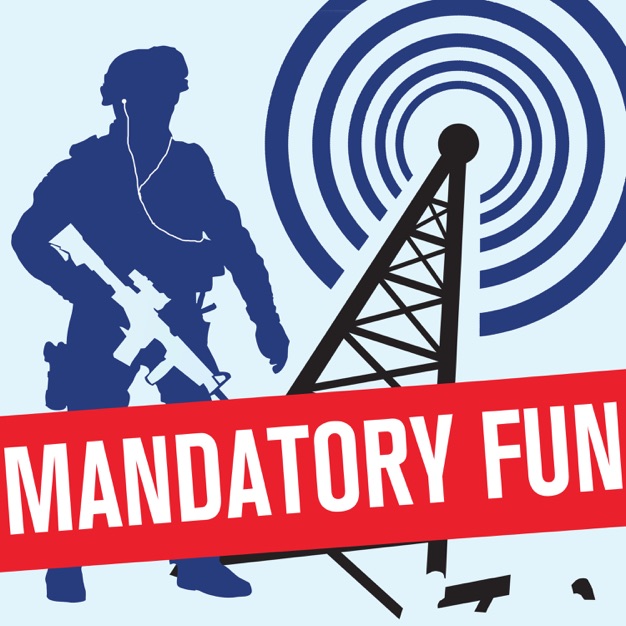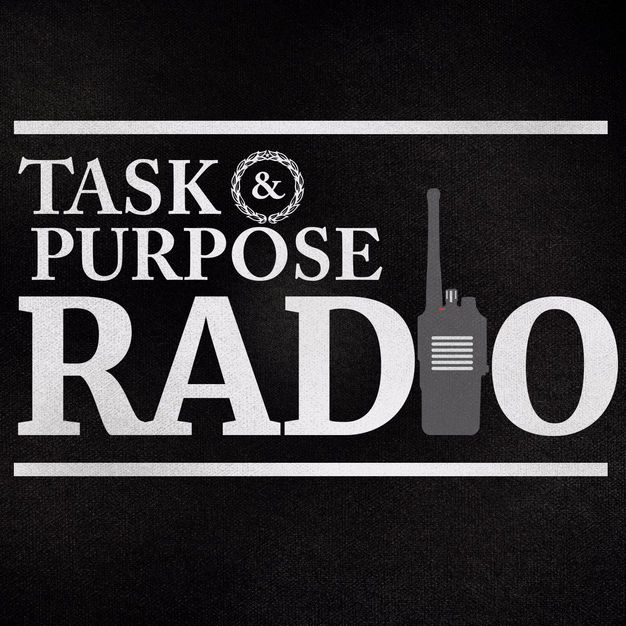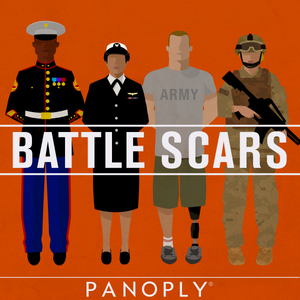
Mandatory Fun
We Are The Mighty
Mandatory Fun is a weekly podcast about the military and pop culture. Join us in breaking cultural tropes and bridging the military-civilian divide through storytelling and entertainment. The show is hosted by the We Are The Mighty's editorial team: Air Force veteran Blake Stilwell, Army veteran Logan Nye, Navy veteran Tim Kirkpatrick, and Navy veteran Orvelin Valle (O.V.).
- 27 minutes 7 secondsThe story of the slave who survived the Alamo
The attack on the Alamo in 1836 was not a 13-day siege and slaughter as often portrayed in film and television. Don't get me wrong – the defenders of the mission-turned-fortress were killed en masse as Mexican troops stormed the structure. It's just that not everyone inside the Alamo died that day.
19 June 2018, 8:48 pm - 35 minutes 18 secondsWhy Navy SEALs will storm the beaches of Normandy in 2018
Jumping into freezing water is just part of the legacy of being a Navy SEAL. During World War II, the U.S. Navy Combat Demolition Units were just a handful of guys equipped only with a pair of shorts, a knife, and maybe some explosives. But the roots of being amphibious is still close to the Navy special warfare community – that's why they still call themselves "Frogmen."
Some 74 years ago, these Navy Combat Demolition Units braved the freezing waters of the English Channel in the predawn hours of June 6, 1944 – not to mention the thousands of Nazi guns pointed at them at the water's edge.
They were trained for this.
Not necessarily the undertaking of being the secret first wave of invaders of the most fortified positions in the world. No, they were trained to win against any and all odds or obstacles. These men were the precursor to modern-day SEALs, moving to do their part on the beaches before the D-Day Landings.
That's how SEAL training works to this day, teaching recruits to overcome the things they think can't be done. Now, in tribute to those few who landed at occupied France well before the rest of the Allies, 30 current and former Navy SEALs, as well as some "gritty" civilians will recreate those NCDU landings.
Today's SEAL re-enactors will do a seven-mile swim to land at Normandy, then they'll scale the cliffs on Omaha Beach, to place a wreath at the memorial there. At that point, they'll gear up with 44-pound rucks to do a 30-kilometer ruck march to Saint-Lô.
Why? To raise awareness (and funds) for the Navy SEAL Heritage Museum in Fort Pierce, Fla. – and the wide range of programs they offer to support family members of those SEALs who fell in combat, doing things only the U.S. special operations community would ever dare.
5 June 2018, 7:00 am - 25 minutes 4 secondsHow going to war brings out the best and worst in people
Our guest Sebastian Junger is not a military veteran. He makes that clear, but he sure sounds like one. Maybe it's because he's seen more conflict than many in the United States military. If there's an expert on modern warfare and the long-term effects of those who live it, that person is Sebastian Junger.
He joins us to discuss his new PBS documentary airing on Memorial Day "Going To War" and explains how people transform before, during and after combat.
28 May 2018, 7:00 am - 29 minutes 46 secondsIt will make you angry to learn how a veteran lost $100k in benefits21 May 2018, 11:02 pm
- 30 minutes 59 secondsPTSD is temporary, here are the first steps to defeating it15 May 2018, 7:00 am
- 29 minutes 9 secondsHow to 'Conquer Anything,' according to a Green Beret1 May 2018, 7:00 am
- 27 minutes 45 secondsCombat poetry reveals what life is like on the Afghan front lines24 April 2018, 7:00 am
- 30 minutes 4 seconds4 survival skills that will help you thrive in a disaster or zombie apocalypse17 April 2018, 7:00 am
- 33 minutes 57 secondsThat time Senator Mitch McConnell was fooled by 'Duffel Blog'10 April 2018, 7:00 am
- 1 hour 4 minutes5 insane stories from the life of Britain's most successful double agent
The real James Bond is finally revealed: A few years ago Larry Loftis decided to stop publishing legal articles and work full-time on researching and writing the story of Dusko Popov, the daring World War II double agent who worked tirelessly to keep the Nazis off guard about the upcoming D-Day invasions.
That work became his book Into the Lion's Mouth: The True Story of Dusko Popov: World War II Spy, Patriot, and the Real-Life Inspiration for James Bond.
Loftis received his undergraduate degree and his Law degrees from the University of Florida. His background in writing stems from his time on the university's Law Review as the Senior Executive Editor and Senior Articles Editor. He is the author of a number of scholarly legal articles.
But you'd never know about Larry's background in dry academic writing by reading his book. Into the Lion's Mouth is a riveting narrative that is as unbelievable as it is addictive. Even former CIA director Michael Morrell called it "impossible to put down.
The most shocking aspect of this book is that every word in it is absolutely true. With the attention to detail that only a lawyer could bring to researching a book of this magnitude, Loftis poured through thousands of historical documents (including MI5 archives) related to Popov and his missions, even revealing that it was actually Popov's adventures which inspired the many tales of Britain's 007, James Bond.
1. Popov was captured by the Nazis before he became a spy.
Dusko Popov was a student in Germany as the Nazis took power and began to persecute the German Jews. No fan of the Nazis, Popov thumbed his nose at the thugs who came to intimidate patrons of Jewish businesses. He was quickly visited by the Gestapo, who imprisoned him and tortured him for information.
He was able to escape Germany because of his family's connections. Hermann Göering ordered his release to Yugoslavia.
2. He was recruited by his best friend.
Johann-Nielsen Jebsen – known as "Johnny" – went to school with Popov. But Jebsen is from a very wealthy European family with German roots. They met each other at the university of Freiburg but where Popov was expelled from Germany, Jebsen, as a German citizen, was forced to join the Nazi war effort. He joins the Abwehr (German military intelligence) as a spy recruiter.
His first recruit is Dusko Popov and the two both became double agents for the British.
3. He warned the U.S. about the attack on Pearl Harbor
Popov warned the FBI on Aug. 18, 1941, that the Japanese were about to attack Pearl Harbor. Popov and his MI6 supervisor met FBI officials at the Commodore Hotel and for three hours laid out the entire plan. Popov was in the country to set up a spy ring in New York and recon the defenses at Pearl Harbor.
The attack was supposed to be a repeat of the British attack on the Italian fleet at the defended port of Taranto in 1940. The Japanese wanted to know how they could be as successful as they enter the war against the Americans. The reason President Roosevelt never saw the information will enrage you.
Check out the book (or finish this podcast) to find out!
4. He was critical to the success of D-Day.
The British determined that the best way to keep the Germans off guard on D-Day was to convince them that the invasion would come at Pas-de-Calais, not Normandy. At the risk of his life, with interrogators who were convinced that Popov was compromised by the British, Popov returned to Germany.
He gave the Nazis the false information the British wanted them to believe during multiple, marathon interrogation sessions that lasted for hours at a time over a series of days. Popov was the only spy who was interrogated by the Nazis about D-Day.
5. His real-world girlfriend was a movie star.
Just like his silver screen counterpart, James Bond, Popov had a slew of women he used for various reasons as a undercover agent for two opposing countries. But his heart belonged to just one – and she was as glamorous as the rest of his World War II life: Hollywood movie star Simone Simon.
3 April 2018, 7:00 am - 22 minutes 7 secondsThis corpsman wants to keep saving lives with 'Combat Medicine'
When Doc Todd left the Navy after spending three years as a corpsman, he didn’t have any transition assistance or training. He lost friends. He lost Marines. After separating from the military, he saw even more of his Marines take their own lives through substance abuse and suicide. It’s wasn’t the ending he had expected when he joined.
He joined the Navy in 2007 after spending four years in sales and restaurant jobs. He wanted to experience some meaningful growth in his life and be part of something bigger than himself. That – to him – meant joining the U.S. Navy. Doc ended up spending the bulk of his time with Marines in “America’s Battalion,” 2nd Battalion 8th Marines. In 2009, he and his Marines were in Afghanistan in Operation Khanjar, the largest aerial insertion of Marine troops since the Vietnam War.
Though he experienced his own struggles upon leaving the military, he didn’t turn to music as a means of coping. He actually waited until he had the strength to better express himself instead.
Doc Todd in the studio.
“Honestly, from an artistic perspective, I didn’t know who I was yet. Or who I was becoming,” Doc says. “I found it very difficult to make a statement musically when I didn’t know what to say.”
When Doc picked himself up was when he was finally able to realize his purpose was helping others. Like a true corpsman, he never wanted to stop looking out for others. He saw too many overdoses, too many suicides. He decides to enter the veteran’s space, but to do it in his own way.
In June 2017, his album Combat Medicine dropped to widespread acclaim and national praise, not to mention a flood of personal stories from those who listened to it and felt the message.
Doc is currently working on a release titled “The Shadow Game EP,” on Runaway Train Records.
Mandatory Fun guest: Doc Todd is combat veteran who proudly served our country as a Fleet Marine Force Corpsman (combat medic) in the United States Navy. Since Doc’s honorable discharge in 2009, Doc moved to Atlanta and worked at restaurants and a premier hospital, while he pursed his college education on the G.I. Bill. Doc graduated from Georgia State University magna cum laude with an undergraduate degree in studying Economics and Public Policy in 2014. He then joined Northwestern Mutual where he began to build a financial management practice, before pursuing his music.
Doc resides in Atlanta with his wife Abby, two young daughters Savannah and Audrey, and dog Memphis, who Doc rescued shortly after coming home from war.
2017’s Combat Medicine
20 March 2018, 7:00 am - More Episodes? Get the App
Your feedback is valuable to us. Should you encounter any bugs, glitches, lack of functionality or other problems, please email us on [email protected] or join Moon.FM Telegram Group where you can talk directly to the dev team who are happy to answer any queries.
 Eagle Nation Podcast
Eagle Nation Podcast
 Task & Purpose Radio: The Warzone
Task & Purpose Radio: The Warzone
 After Action with Max & Paul
After Action with Max & Paul
 Battle Scars
Battle Scars
 Veterans Chronicles
Veterans Chronicles
 Chairborne Commandos - Military News, Technology, And Special Operations
Chairborne Commandos - Military News, Technology, And Special Operations